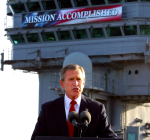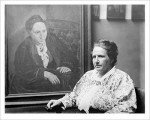Letter from Berlin: D-Day and Long After
BERLIN—Gee, I certainly didn’t intend to become a spy. Er, I mean, an operative in the international “intelligence community.” It happened last Sunday, the 60th anniversary of D-Day, a sunny, springtime noon-hour in Berlin. I was sitting at a shaded table at an outdoor café, just off the entrance to the Deutsche Theatre, waiting for Richard Clarke, the former U.S. presidential adviser on counter-terrorism, to turn up for an afternoon talk.
Meanwhile, at the western edge of the continent, the politicians were on the Normandy beaches that day, photo opping the commemoration of the crucial Allied landings in France on June 6, 1944. George W. Bush, the self-proclaimed U.S. “war president,” was in full campaign mode. The coalition of the willing-to-be-photographed included our own beleagured Paul Martin, even as Stephen Harper’s Neo-Conservative troops were storming the beaches of Lake Ontario. But the real news of the D-Day observances, at least for Europeans, was the first-time invitations to participate in the ceremonies extended to Russian President Vladimir Putin and, more important, German Chancellor Gerhard Schroeder.
It was one more way to say that World War II is really over, and it was also a way for French President Jacques Chirac to nudge the Bush empire in the ribs over its sneers about “old Europe.” As for Schroeder, he needs all the help he can get. Germans are in a desultory mood about the politics of the Bundesrepublik these days. The country has been in economic recession for the last 4 years and the governing Social Democratic-Green Party coalition is running a good 20 points behind their conservative Christian Democratic rivals in the polls, even though everybody admits that they don’t think the Christian Democrats have any solutions to Germany’s doldrums either.
While the old pols were remembering the old war, back in the U.S., former President Ronald Reagan died at age 93, and on the beaches and in the corridors of the United Nations in New York, the Bush administration was fighting the new war in Iraq (which is a safer place to fight it than on the streets of Baghdad). Reagan’s death was the occasion for launching a week-long orgy of state funeral pomp and an enormous amount of sentimentality about the “Great Communicator’s” 8-year “it’s morning in America” regime in the 1980s.
While rummaging through the Net, I ran into a typical, gushing reminiscence of Reagan by the guy who wrote the “tear down this wall” speech that Reagan gave in Berlin in 1987. In this adulatory encomnium, the former presidential speechwriter papers over the trillion-dollar deficit the Reagan administration rolled up with its goofy “trickle-down” economic policies, skips the cultural civil wars, and forgets to mention the quiet, little, illegal Contra War in Latin America that the Reaganites conducted to make the hemisphere safe for capitalism. Proving only once again that History is written by the winning amnesiacs.
Underneath the pageantry, the new war has taken a remarkable U-turn. Having made a botch on the banks of the Euphrates, the Bush administration was crafting a new U.N. resolution legitimizing the Iraqi quagmire. The resolution was being stickhandled by U.S. Ambassador to the U.N., John Negroponte, the future U.S. Ambassador to Iraq, and—for those who aren’t historically gaga—the guy who, as U.S. Ambassador to Honduras in the 1980s, ran the Contra operation. It was the most multilateral, U.N.-respectful, totally cooperative resolution in the history of the Bush administration.
In short, it was everything that the Bushies had sneered at for the last two years, when they thought the war in Iraq would be a walk in the Hanging Gardens of Babylon. Now, when the French diplomat objected to a preposition in line 46 of paragraph 18, there were no more jibes about “old Europe,” instead there was forelock-tugging and amiable redrafting.
Of course, the resolution unanimously passed by the U.N.’s Security Council on Tuesday doesn’t exactly solve everything. The Kurds, who live in the northern part of Iraq, and who are about the only people who have shown the slightest bit of interest in a secular, more or less democratic government in the country, were miffed because the resolution didn’t safeguard their rights, or lessen their worries about Iraq eventually being turned into a Shiite-run Islamic republic, a la neighbouring Iran. But whether the U.N. resolution turns out to be a Trojan Horse can left for a later day.
Speaking of Trojan horses, back in Berlin, the only beaches being stormed were those of Troy, which is currently showing Brad Pitt’s pecs on about 50 screens around town. As I say, I was minding my own business, waiting for Richard Clarke, the author of Against All Enemies to turn up, when three guys in suits and ties, each carrying copies of Clarke’s book, plopped down at the table next to mine. The threesome consisted of Gary Smith, head of the American Academy in Berlin, which was co-sponsoring Clarke’s talk along with his German publisher, which had just released the German translation; and Clarke’s two interlocutors for the afternoon, Richard Bernstein, Berlin bureau chief of the New York Times; and John Kornblum, former U.S. Ambassador to Germany, and currently a director of Lezard investment bankers.
I never would have become a spy if Kornblum hadn’t been talking so loud. “I hate the son of a bitch,” Kornblum boomed out to Bernstein as the chubby-cheeked career diplomat plopped down in his chair and the two began rehearsing the afternoon’s conversation. Kornblum went on to tell Bernstein that Clarke was pretty much regarded in government circles as a “whacko” who couldn’t get along with anybody.
Naturally, after that I was all ears. I pulled out my own book from my bookbag as standard continental op cover and took some covert notes. (Just for the record, the book was Amos Elon’s The Pity of It All: A Portrait of Jews in Germany 1743-1933, Penguin, 2002.) But spying, as everybody who’s read a John LeCarre novel knows, is a pretty boring business. I got the logistics of Clarke’s arrival from the posh Adlon Hotel, but beyond that it was mainly Kornblum grousing about Clarke’s book selling 600,000 copies.
Once Clarke appeared, and everybody was comfortably ensconced in their black leather chairs on the stage of the Deutsches Theatre, it was pretty low-key. Clarke’s Against All Enemies (reviewed on these screens, “Smoking Guns,” Apr. 12, 2004) makes three main points, and he made them again last Sunday, before a fairly full-house audience of what mainly looked like academics and students.
The three points are: first, prior to the Sept. 11, 2001 terrorist attack on the U.S., Clarke, who was Bush’s presidential adviser on counterterrorism (as he had been to two previous presidents, Bill Clinton, and George Bush Sr.), had been unable to get Dubya, Dick Cheney, Don Rumsfeld, Condi Rice, and the rest of the self-dubbed “Vulkans,” the least bit interested in the threat of terrorism. If they had become interested, there was an outside chance they could have done something—but as Clarke admits, no more than an outside chance. Second, the Bush administration was obsessed with Iraq and as early as Sept. 12, Bush himself ordered Clarke to look for an Iraq connection. Even as they were gearing up for a war in Afghanistan, they were planning the war in Iraq. Finally, the war on Iraq was a mistake, and utterly counterproductive, Clarke argues. Rather than countering terrorism, it has only inspired further recruitment to terrorist causes.
None of those claims is particularly startling, and most of the charges have since been confirmed. What made them so startling when Clarke’s book appeared last March and when Clarke repeated them in the following days all over the media and in front of the independent national commission investigating the events of 9/11, was the source. Clarke was a 30-year career bureaucrat, a hawkish Washington jesuit, a U.S. patriot with impeccable credentials. For him to offer a portrait of the president as bumbling, inattentive, deceptive, and misguided was something not to be ignored. And in the midst of the quadrennial American presidential election, it could also be a factor.
If the opinions of John Kornblum, another 30-year career bureaucrat, are recorded in the confidential reports of skilful professional eavesdropping snoops, they weren’t on display Sunday afternoon in the Deutsches Theatre. Instead, Kornblum respectfully and quietly sniped at Clarke’s complaints about the administration’s unpreparedness for 9/11, pointing out that presidents are surrounded by advisers, each of whom has an issue. Clarke agreed it was hard to get a president’s ear, but contrasted his experiences with Clinton, suggesting that it was easier to get a president’s ear if it was connected to a president’s mind.
He also quietly insisted, “Iraq did not threaten the United States,” but that’s not exactly news in Europe, where about 80 per cent of the population consistently opposes the war, and where the distaste for George Bush is palpable.
Meanwhile, in the row in front of me in the theatre, the group of burly Russian students—at least they looked like Russians to an attentive spy—were getting bored. About halfway through the afternoon, they began playing digital basketball on their cellphones. Oh yeah, and at the end there was a heckler/questioner—what’s a political afternoon without one of these guys?—who wanted the panelists to admit that Vice-President Dick Cheney was the spawn of Satan. As a trained operative, I immediately pegged the guy as an agent of the Lyndon LaRouche group, a nutbar American political sect, but I didn’t take notes since I figure they’ve already got plenty of intelligence community plants inside their organization. Roger, and over.
Berlin, June 11, 2004


